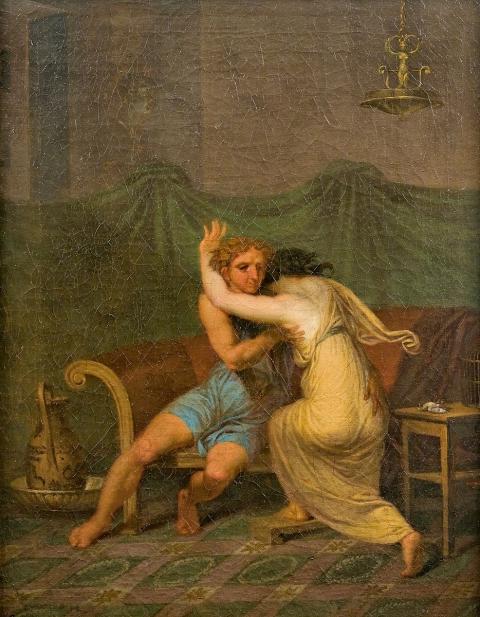Riya Juneja
March 21, 2022
I have always enjoyed Latin class because it felt like a puzzle, much like math. Find the verb, find the noun that matches with the right case, number, and gender, then piece it all together. I had never connected with the language beyond its algebraic nature until my teacher gave me the opportunity to take ownership over the material — with a self-directed research assignment to be presented at a colloquium. Completing this project during a period of remote learning, I felt inspired by the ability to have greater independence and take control of my own learning. On top of all that, we would be presenting our work to the entire school and the wider community at the end of the year.
But first, I needed to choose what I wanted to study.
In an unexpected way, my topic came to me quite suddenly one night, while watching episodes of Gilmore Girls, a favorite TV show I turn to when I’m in need of comfort or a cozy night in. I noticed that certain scenes in Gilmore Girls mirrored lines from Catullus’ poetry, which my Latin class had been studying the previous semester. In an early episode of Gilmore Girls, the main character, Rory, struggles after breaking up with her boyfriend and tells her mother, “I’m ready to wallow now” as she curls up with a tub of ice cream (season 1, episode 17). Similarly, in his eighth poem, Catullus depicts a miserable lover struggling to let go of his ex, Lesbia: miser Catulle, desinas ineptire, | et quod uides perisse perditum ducas (“miserable Catullus, cease to be a fool, and consider lost that which you see has perished,” Catullus 8.1–2). As he repeats the fact that she is gone, he implies that in a way she would be dead without him. As a pathetic way to build himself up, he asks her quae tibi manet uita? (“what sort of life remains for you?,” 8.15). Both Catullus and Rory prefer to wallow in sadness and pity rather than move on after a breakup. Rory’s instinct to hold on to a lost love is no different from that of the lovers written about millennia ago by Catullus.
Excited about the new connection, I was compelled to investigate further. Were there other parallels between ancient works and modern media? And so, under the framework of my teacher’s open-ended research assignment, I cultivated and expanded on this moment of discovery. It was then that Catullus started haunting me in everything I consumed — books, shows, even songs. Latin poetry permeated my life in ways that I didn’t expect.
I was possessed.
Everywhere I looked, themes from Catullus’ poetry appeared. Re-reading the end of Little Women over breakfast one day, I noticed that Alcott’s romantic ideals were also present in Catullus 107. Both works prioritize the joy of love over material possessions. Following the project guidelines, I researched these two primary sources in greater depth. From Armand D’Angour’s article, I learned that the Hellenistic poet Callimachus largely focused on small-scale ideas, and he inspired the Roman neoteric poets, including Catullus; poem 107 illustrates this influence in its focus on the simple joy of love. There were also similar ideas written about Little Women. Elena Nicolaou noted that Louisa May Alcott wrote “about what she knew: Her experiences with her sisters. Alcott was pleased with the resulting ‘simple and true’ book.” Following my teacher’s requirements for consulting a certain number of secondary sources, I built on existing scholarship and my own analysis: similar to the Callimachean Catullus 107, the intention of Little Women was to elevate simple snapshots of life that might otherwise go overlooked but are no less important than something grander or more serious.
Armed with sundry connections, primary and secondary research, and my own critique of Catullus’ male-centered narrative, I was ready to write, and the words flowed from my head and onto the page.
Authentically and intensely engaging in the process of interest-driven inquiry and research has sharpened my analytical skills and changed the way I see and think about the world around me, inescapably identifying the influence of Roman elegy in my own contemporary culture. For instance, Catullus 85 instantly reverberated through my head listening to Olivia O’Brien’s “hate u, love u” on the subway one day. O’Brien sings “I hate you, I love you, I hate that I love you … I hate that I want you,” echoing Catullus’ lament, odi et amo. quare id faciam, fortasse requiris. | nescio, sed fieri sentio et excrucior, “I hate and I love. Why do I do this, perhaps you ask. I do not know. . . I am tortured” (Catullus 85.1–2). Thanks to my knowledge of Latin, coupled with the 21st-century pop culture that I live and breathe, when listening to O’Brien’s song, I could easily compare Catullus’ use of odi, “hate,” and amo, “love” — adjacent verbs with contrasting meanings — with O’Brien’s succinct juxtaposition of the same sentiments. I sure wouldn’t have thought twice if Catullus had written this song!
Though Catullus experiences many of the same emotions as the young women and teenage girls I describe (Jo, Rory, Olivia), these continuities belie a major difference between Catullus’ world and our own: Catullus is a man character writing in a society governed by men, but Jo, Rory, and Olivia are women characters in a changing society with ever more possibilities for women. These works enrich and diversify the tradition of which Catullus stands at the beginning — or at least near to it. The fact that Jo, Rory, and Olivia experience similar feelings that echo Catullus’ own work illustrates that pain and heartbreak are universal concepts not specific to one gender, concepts that transcend time and remain even as the society around them evolves. These parallels are like an act of translation, a two-way bridge from present to past and from past to present: "crossing" the bridge allows us to better understand ourselves.
This project allowed me to contextualize Catullus' writing on my own, based on my interests, with the added bonus of realizing how much I could discover through original and independent research. Furthermore, I was able to conclude that modern media offers fresh spins on old ideas with repeated themes covering the full spectrum of love, from pining over a lost lover to the conflicting emotions of love and hate, and even the joy one experiences from love. Most importantly, I learned that translating provides insight into contemporary life, and contemporary life can help us gain further insight into those who came before us.
Often, high-school Latin does not lend itself to student-centered learning, and the interplay between the ancient and modern worlds is too frequently ignored in the secondary-school Latin classroom. Because this project gave me the freedom to connect the language to my interests outside of Latin, however, I took responsibility for my own learning, and in doing so, made a profound discovery about the way in which ancient culture can speak to our current generation. Finding explicit connections between Latin texts and modern pop culture rendered ancient works meaningful and relatable. The combination of choice within a more structured assignment framework provided the intellectual space to successfully dive into an original research project.
I’d recommend Latin teachers consider implementing these ideas in order to better engage their students, especially during times when classroom learning becomes remote. Just like Gilmore Girls taught me that themes from Classics live on in modern media, I believe there’s a lesson in there for teachers as well when Rory’s high school English teacher says, “what I teach is more than literature, it's lessons in life.” In the same way, my experiences have taught me that it’s possible to gain a deeper understanding of a subject when we apply it beyond the classroom, to our real lives.
Header image: "Catullus and Lesbia, who in his arms seek solace for the death of her sparrow" by Nicolai Abildgaard. Image courtesy of Wikimedia Commons.
Authors


